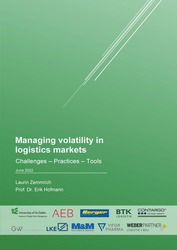| Fachbereiche | |
|---|---|
| Buchreihen (97) |
1381
|
| Nachhaltigkeit |
3
|
| Gesundheitswesen |
1
|
| Geisteswissenschaften |
2369
|
| Naturwissenschaften |
5408
|
| Ingenieurwissenschaften |
1795
|
| Allgemeine Ingenieurwissenschaften | 292 |
| Maschinenbau und Verfahrenstechnik | 862 |
| Elektrotechnik | 688 |
| Bergbau- und Hüttenwesen | 30 |
| Architektur und Bauwesen | 75 |
| Allgemein |
98
|
|
Leitlinien Unfallchirurgie
5. Auflage bestellen |
|
Erweiterte Suche
Managing volatility in logistics markets
Challenges – Practices – Tools
Erik Hofmann (Autor)Laurin Zemmrich (Autor)
Vorschau
Leseprobe, PDF (1,2 MB)
Inhaltsverzeichnis, PDF (84 KB)
The motivation of the Institute for Supply Chain Management (ISCM) at the University of St.Gallen to write the present study is to investigate influencing factors, challenges, and measures related to freight price volatility in the transport modes of sea, road, rail, and air. In addition, the study seeks to answer the question of which practices shippers, carriers, and intermediaries can leverage to counteract fluctuating freight rates in logistics markets. Because freight prices in the different transport modes have received limited attention in previous research, we create a basic understanding of the effects of different influencing factors on the formation of volatile freight prices. The aim is to reduce the lack of transparency in the formation and development of freight prices to be able to make well-founded and market-oriented decisions in the context of price planning, management, and control. In addition to an improved understanding of the origin of transport prices, this study provides practitioners with a basis for implementing concrete solutions. To achieve this objective, we define relevant criteria to carry out a suitable segmentation of logistics markets. Based on these criteria, including geographical scope, transport mode, and load carrier, we investigate four relevant logistics scenarios within the study. To this end, the study derived, among other things, building blocks of concrete practices for the various transport modes and linked them to the underlying volatility sources. Furthermore, we develop and analyze a map of digital business models in transportation, including marketplaces, software solutions, and digital platforms, as well as an extensive list of companies and (freight price) indices, which serve as a starting point for identifying suitable tools and software solutions for dealing with fluctuating freight prices.
| ISBN-13 (Printausgabe) | 9783736976337 |
| ISBN-13 (E-Book) | 9783736966338 |
| Buchendformat | A4 |
| Sprache | Englisch |
| Seitenanzahl | 132 |
| Umschlagkaschierung | matt |
| Auflage | 1. |
| Erscheinungsort | Göttingen |
| Erscheinungsdatum | 22.06.2022 |
| Allgemeine Einordnung | Sachbuch |
| Fachbereiche |
Ingenieurwissenschaften
Maschinenbau und Verfahrenstechnik Luft- und Raumfahrttechnik |
| Schlagwörter | Volatilität, Seefracht, Strassengüterverkehr, Schienengüterverkehr, Luftfracht, Fracht, Logistik, Anforderungen, Interkontinental, Export, Import, Neue Seidenstrasse, Störfall, Digitalisierung, Belly-Fracht, Corona, Krisenmanagement, Kapazitätsengpässe, Transparenz, Verkehrsströme, Logistik Indices, Digitale Geschäftsmodelle, Transportpreise, Transportpreisentwicklung, Management Praktiken, Logistikdienstleister, Verlader, Suez Kanal Blockade, Container, Russland-Ukraine Krise, Volatilitätsquellen, Frachtführer, Onlinehandel, Digitale Plattform, Frachtenbörsen, TMS Systeme, Digitale Spedition, Digitalisierung, Alternative Treibstoffe, Infrastruktur, Volatility, Sea freight, Road freight, Rail freight, Air freight, Cargo, Logistics, Requirements, Intercontinental, Export, Import, New Silk Road, Disruption, Digitization, Belly freight, Covid-19, Crisis management, Capacity bottlenecks, Transparency, Verkehrsströme, Logistics indices, Digital business models, Transport prices, Transport price development, Management practices, Logistics service provider, Shippers, Suez Canal Blockage, Container, Russia-Ukraine crisis, Volatility sources, Carrier, E-commerce, Digital platforms, Freight exchanges, TMS systems, Digital forwarder, Digitization, Sustainable aviation fuels (SAF), Infrastructure |
| URL zu externer Homepage | https://www.alexandria.unisg.ch/266520/ |








